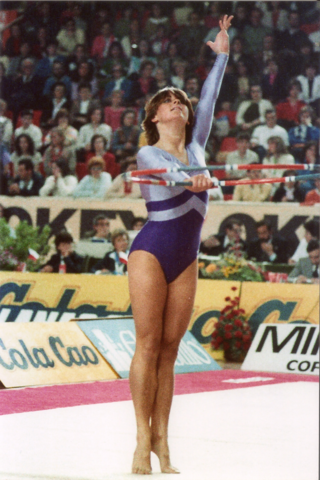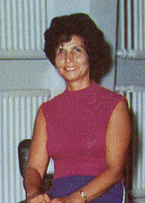
Rhythmic gymnastics is a sport in which gymnasts perform on a floor with an apparatus: hoop, ball, clubs, ribbon and rope. The sport combines elements of gymnastics, dance and calisthenics; gymnasts must be strong, flexible, agile, dexterous and coordinated. Rhythmic gymnastics is governed by the International Gymnastics Federation (FiG), which first recognized it as a sport in 1963. It became an Olympic sport in 1984, with an individual all-around event. The group all-around competition was added to the Olympics in 1996. At the international level, rhythmic gymnastics is a women-only sport. The most prestigious competitions, besides the Olympic Games, are the World Championships, World Games, European Championships, European Games, the World Cup Series and the Grand Prix Series. Gymnasts are judged on their artistry, execution of skills, and difficulty of skills, for which they gain points. They perform leaps, balances, and rotations along with handling the apparatus.
Isabel Benavente, is a former Spanish rhythmic gymnast.

Carmel Kallemaa is an Estonian-born Canadian rhythmic gymnast. She is a Commonwealth Games champion and a Pan American Championships medalist.
Mireia Martínez is a Spanish rhythmic gymnast. She's the bronze All-Around and 5 hoops medalist at the 2022 World Championships.

Marta Aberturas Rubio is a former Spanish rhythmic gymnast, world group champion in Athens 1991, in addition to achieving numerous other medals with the Spanish national rhythmic gymnastics team. The generation of gymnasts that she joined is known by the pseudonym of the First Golden Girls.

Victoria Cuadrillero is a Spanish former rhythmic gymnast who competed with the national group of Spain.
Ana Gayán is a former Spanish rhythmic gymnast who competed with the national group of Spain.
Sara Salarrullana is a former Spanish rhythmic gymnast who competed with the national group of Spain.
Lía Rovira is a former Spanish rhythmic gymnast who competed with the national group of Spain.
Alba Polo is a Spanish former rhythmic gymnast who competed with the national group of Spain.

Emma Reyes is a former Spanish rhythmic gymnast who competed with the national group of Spain.

María Jesús Alegre Etayo, also known as Chus Alegre, is a Spanish former rhythmic gymnast. She achieved, among other medals, the bronze in the general of the World Championship in Madrid in 1975, the first medal in an international competition for the Spanish national team and the only one in the individual All-Around of a World Championship to date. She won another three more medals in that World Cup and was also absolute champion of Spain in 1976 and 1977.

Ana Bautista Reyes is a former Spanish rhythmic gymnast who was a member of the Spanish national team of rhythmic gymnastics in individual form. In 1989 she won the first official gold medal for Spanish rhythmic gymnastics, with rope in the European Cup finals in Hanover, among others. She was Spanish champion in 1989.

África Blesa is a Spanish former rhythmic gymnast. She was part of the first national rhythmic gymnastics team in Spain and participated in the World Championship in Madrid in 1975.
The Royal Spanish Gymnastics Federation is the highest national gymnastics body in Spain. Its headquarters are in Madrid and its current president is Jesús Carballo. Founded by Narciso Masferrer in 1899 as the Spanish Gymnastic Federation, it is the second oldest Federation in Spain, behind the cycling one. The federation was one of the most important entities in the amateur beginnings of Football in Spain because it acted as the Spanish Football Federation until 1904.

Daniela Bošanská is a Czech former rhythmic gymnast. She is a European and World medalist and three-time Czech national champion.
Iveta Havlíčková is a Czech former rhythmic gymnast. She's a two times World bronze medalist.

Ivanka Chakarova was a Bulgarian rhythmic gymnastics coach and judge. She was the first national coach in the history of the Spanish national rhythmic gymnastics team, between 1974 and 1978. She is considered one of the main promoters of Bulgarian and Spanish rhythmic gymnastics.

Catherine Xaudaró Apellániz is a Spanish former rhythmic gymnast. She won a bronze medal at Worlds in 1975.

Susana Mendizábal is a former Spanish rhythmic and artistic gymnast. She is the first Spaniard to win a medal in the European Championships, winning bronze in 1978.







